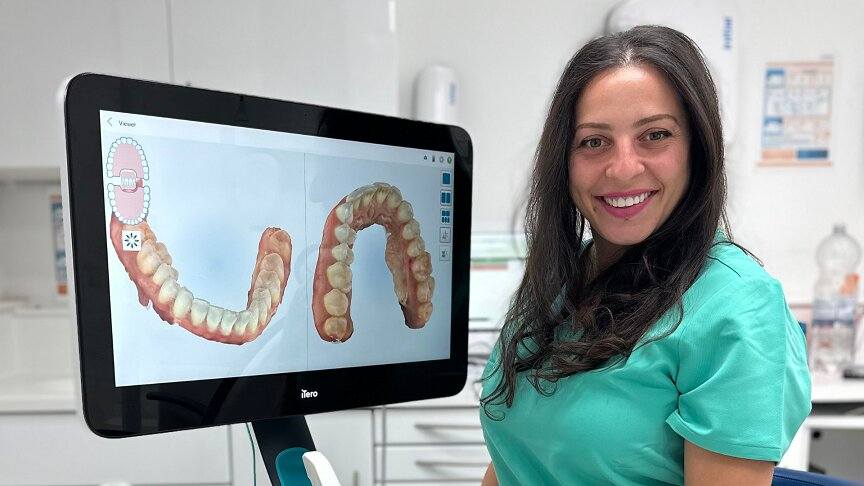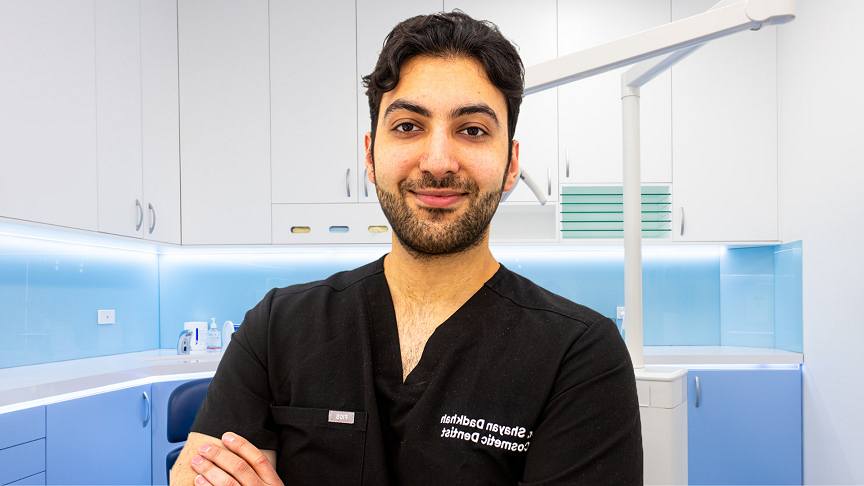Veneers are one of the most popular cosmetic dental treatments for achieving a flawless smile — but one of the most common questions patients ask before treatment is: “Do veneers feel like real teeth?” The short answer: yes, they do — when done by an experienced cosmetic dentist using high-quality materials and precise placement techniques.
In this in-depth guide, we’ll explore what veneers feel like, how they compare to natural teeth, what factors influence their comfort and how to ensure your veneers look, function and feel completely natural for years to come.
Whether you’re considering porcelain veneers, composite veneers or Lumineers, this guide will help you understand every aspect of what it’s like to live with veneers — from the first few days to years after treatment.
💡 Visit our two dental veneer clinics in Central London at Whites Dental.
Key Takeaway
If you’re wondering whether veneers feel natural, here’s what you need to know:
- Modern veneers feel almost identical to real teeth. When fitted correctly, you won’t notice a difference in daily activities like eating, speaking, or smiling.
- High-quality porcelain veneers (such as Emax or Zirconia) replicate the translucency and texture of enamel, ensuring a completely natural look and feel.
- Proper placement by an experienced dentist is crucial — poor fitting veneers can feel bulky or uncomfortable.
- Temporary veneers might feel slightly different, but permanent ones should blend seamlessly with your bite.
- Good aftercare and oral hygiene help maintain comfort and natural sensation over time.
What Are Dental Veneers?
Dental veneers are thin, custom-made medial grade aesthetic shells designed to cover the front surface of teeth. They’re made from porcelain or composite resin and are bonded permanently to your natural teeth to enhance shape, colour, and alignment.
Veneers can correct multiple cosmetic concerns including:
- Discolouration that can’t be treated with whitening
- Worn or chipped teeth
- Gaps between teeth
- Uneven or slightly crooked teeth
- Irregular tooth size or shape;
💡 When fitted correctly, veneers mimic the texture, shine and translucency of natural enamel, creating a realistic and comfortable smile that feels like your own teeth.
How Do Veneers Feel Compared To Real Teeth?

The goal of veneers is to make your smile look and feel natural. Here’s what you can expect in terms of sensation, appearance and function.
1. Texture And Smoothness
High-quality veneers, especially porcelain types, are polished to a glass-like smoothness. They feel as sleek as natural enamel when you run your tongue across them. After the initial adjustment period (usually a few days), most patients can’t distinguish between veneers and their natural teeth.
2. Bite And Functionality
Properly fitted veneers align perfectly with your natural bite. You should be able to chew, bite, and speak as you normally would. Any discomfort, sharp edges, or uneven bite can usually be corrected with a simple adjustment.
3. Temperature Sensitivity
You might notice slight sensitivity to hot or cold food right after placement, but this is temporary. Once your teeth adjust, the sensation becomes the same as with natural teeth.
4. Comfort When Speaking
Because veneers are ultra-thin and custom-contoured, they don’t alter the way your lips and tongue move during speech. After the first few days, your pronunciation returns to normal.
Factors That Affect How Veneers Feel
Not all veneers feel identical. Their comfort and realism depend on several important factors.
1. The Skill Of Your Dentist
Your cosmetic dentist’s precision is critical. Expert dentists, like those at Whites Dental in London, carefully design each veneer to match your natural tooth contours and bite alignment. This ensures a seamless, comfortable fit that feels like part of your mouth rather than an addition.
2. Type Of Veneer Material
Porcelain veneers tend to feel more natural due to their enamel-like surface and durability. Composite veneers, while more affordable, can sometimes feel slightly thicker or less polished.
Common types include:
- Porcelain Veneers: Highly natural look and smooth texture.
- Emax Veneers: Ultra-thin, strong, and incredibly lifelike.
- Lumineers: No-prep veneers that are ultra-thin (around 0.2mm), offering minimal alteration to natural teeth
3. Tooth Preparation
The amount of enamel shaved before applying veneers also affects how they feel. Minimal-prep or no-prep options (like Lumineers) preserve more of your natural tooth structure, leading to a more natural feel.
4. Fit And Adhesion
If veneers are not perfectly bonded, they can feel slightly bulky or uneven. Proper bonding ensures the veneers sit flush against your teeth, feeling smooth and natural to the touch.
5. Bite Adjustment
After placement, minor bite adjustments are sometimes needed to ensure both comfort and function. Once this is done, your veneers should feel completely natural while biting or chewing.
Do Veneers Feel Different When Eating?

When properly fitted, veneers should feel no different from natural teeth while eating. You can bite into most foods as you normally would, though your dentist may advise caution with extremely hard or sticky foods (like toffees or ice).
Here’s how veneers perform in everyday situations:
- Chewing: Feels natural once your bite is balanced.
- Temperature changes: Minimal to no difference after adjustment period.
- Food texture: You’ll continue to sense texture and pressure normally since your tooth roots remain active.
💡 The only adjustment period may be the first few days post-treatment, as your tongue and bite adapt to the new surfaces.
Do Veneers Feel Bulky Or Unnatural?
Properly designed veneers by an experienced dentist do not feel bulky. In fact, one of the hallmarks of a skilled dentist is crafting veneers that blend seamlessly with your natural smile. Bulky or uneven veneers typically result from:
- Inadequate tooth preparation;
- Incorrect veneer sizing
- Poor bonding technique
💡 At Whites Dental, veneer design and fitting involve digital smile design technology, allowing dentists to visualise your results before placement — ensuring your veneers complement your face and bite comfortably.
How Long Does It Take For You To Get Used To Your Veneers?
Most patients adapt to their veneers within a few days to a week. During this time, your mouth adjusts to the new shape and feel of your teeth. Some people experience minor differences when speaking or eating, but this resolves quickly. By the end of the first week, most patients forget they even have veneers — they simply feel like natural teeth.
💡 If discomfort lasts longer, your dentist can check for alignment or bite issues and make small refinements.
Can You Feel Veneers When You Run Your Tongue Over Them?
Yes — and that’s completely normal. You’ll feel the smoothness of the porcelain surface when you touch your veneers with your tongue, much like polished enamel.
💡 Within a few days, your brain recognises the veneers as part of your natural mouth structure and the sensation becomes completely familiar.
Are There Any Sensory Differences Between Veneers And Natural Teeth?
While veneers mimic natural enamel perfectly in appearance and texture, they differ slightly in structure. Your natural tooth underneath still senses pressure and temperature through the nerve, but the veneer itself doesn’t have nerves. This means:
- You still feel pressure and contact during chewing
- Veneers don’t conduct temperature as strongly as natural enamel, often reducing sensitivity.
- There’s no discomfort or foreign feeling once adjusted.
The Role Of Proper Aftercare In Comfort
After your veneers are placed, maintaining good oral hygiene is essential to keep them feeling natural and healthy.
Daily Veneer Care Tips
- Brush gently twice daily with a soft-bristled toothbrush and non-abrasive toothpaste.
- Floss daily using veneer-safe techniques or interdental brushes.
- Avoid using teeth as tools (e.g., to open packaging).
- Wear a nightguard if you grind your teeth.
- Attend regular dental checkups every six months for polishing and bite assessment.
💡 Good care ensures that your veneers remain comfortable, smooth and natural-feeling for decades.
Common Reasons Veneers May Feel Uncomfortable
Although rare, veneers might feel unnatural at first if:
- There’s a minor misalignment with your bite.
- The veneer edges are slightly overhanging
- You’re experiencing temporary gum inflammation after bonding.
- There’s an uneven bonding layer underneath.
💡 These issues are easily corrected by your dentist through small adjustments or polishing.
Comparing The Feel: Veneers Vs. Natural Teeth
| Feature | Natural Teeth | Veneers |
|---|---|---|
| Texture | Smooth enamel surface | Polished, glass-like porcelain |
| Bite Feel | Natural pressure sensitivity | Feels the same once adjusted |
| Temperature Sensitivity | Normal | Slightly reduced |
| Sound When Speaking | Natural speech resonance | No noticeable change |
| Longevity | Can wear or chip | Highly durable with proper care |
How To Ensure Veneers Feel Natural From Day One
Your comfort begins with choosing an experienced dentist and a personalised treatment plan.
At Whites Dental, our veneer specialist dentists have a specific process, which includes:
- Consultation and Smile Assessment
Your dentist evaluates your smile, bite, and tooth structure to plan veneers that align perfectly with your mouth. - Digital Smile Design
Advanced imaging technology previews your final smile, allowing precise adjustments before treatment begins - Tooth Preparation
Minimal enamel is reshaped to allow veneers to fit flush with your natural teeth. - Temporary Veneers (if needed)
Worn for 1–2 weeks to ensure comfort before final bonding. - Final Veneer Placement
Custom veneers are permanently bonded, followed by bite adjustments to ensure perfect comfort. - Follow-Up Appointments
Your dentist checks comfort, bite and function to confirm your veneers feel as natural as your real teeth.
How Long Do Natural-Looking Veneers Last?
High-quality porcelain veneers typically last 10–20 years or more when cared for properly. During that time, they continue to look and feel natural, resisting discolouration and wear far better than natural enamel.
Durability depends on:
- Material type (Emax or Zirconia are longest-lasting)
- Bite alignment.
- Oral hygiene.
- Avoidance of harmful habits (grinding, biting hard objects)
Why Choose Whites Dental For Natural-Looking Veneers In London
At Whites Dental, we specialise in bespoke, natural-feeling veneer treatments that enhance smiles without compromising comfort or oral health. We have two convenient London locations:
Whites Dental Waterloo (near London Bridge)
📍 172 Blackfriars Rd, London SE1 8ER
📞 020 8616 0590
Whites Dental Marble Arch (W2)
📍 52B Kendal St, St George’s Fields, London W2 2BP
📞 020 3576 2325
💡 Both clinics use advanced smile design technology and ultra-thin veneer materials to deliver smiles that look stunning and feel completely natural.
Conclusion: Veneers Should Feel Like Your Real Teeth
Modern veneers, especially those crafted from advanced materials like Emax porcelain, are designed to replicate the look, function and feel of real teeth with incredible accuracy. Once fitted properly, they become indistinguishable from your natural enamel — both visually and in daily use. You can smile, speak, and eat confidently without discomfort or artificial sensation.
💡 Choosing an experienced cosmetic dentist, like the team at Whites Dental, ensures that your veneers not only look beautiful but also feel completely real from the moment they’re placed.
